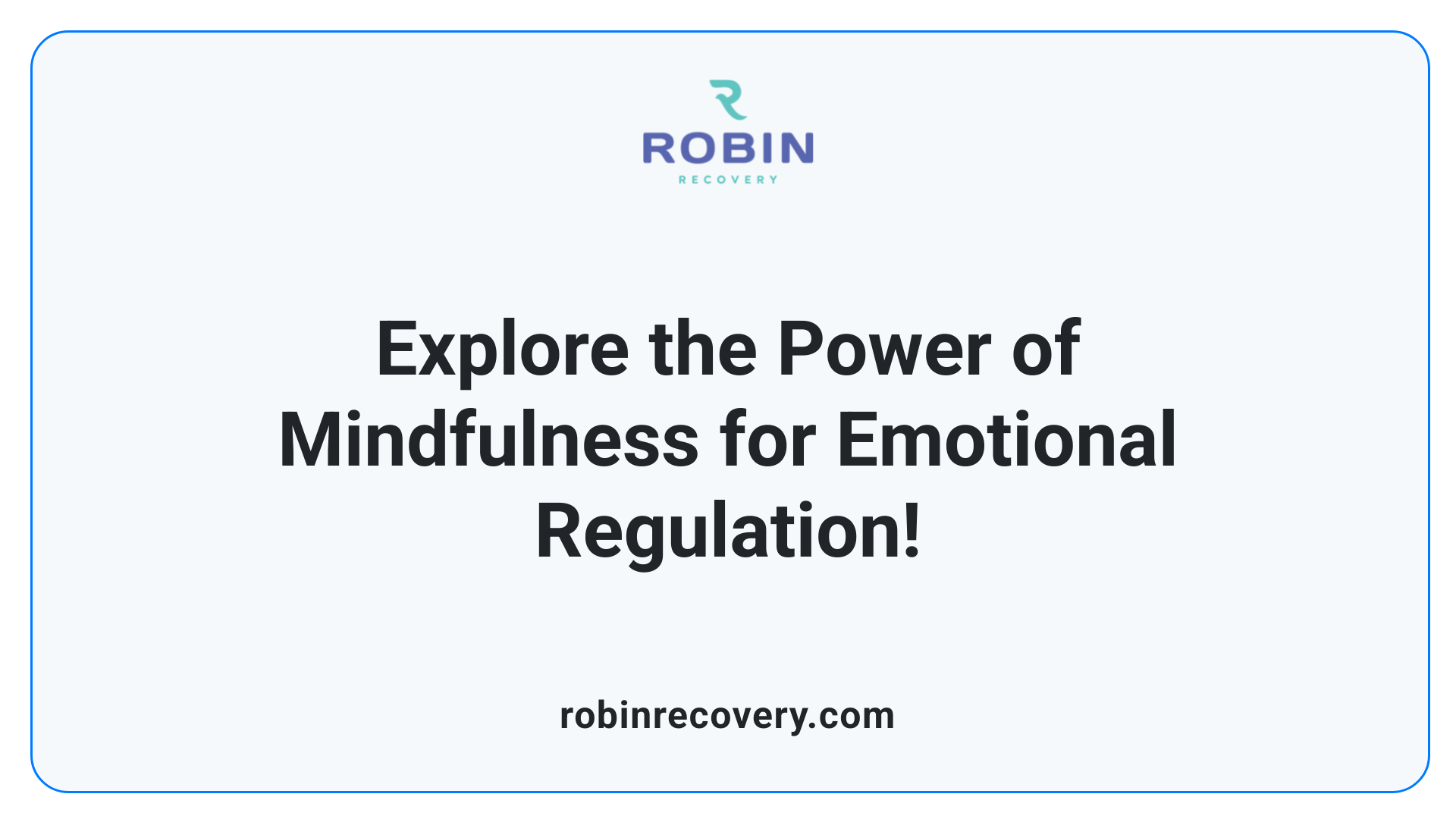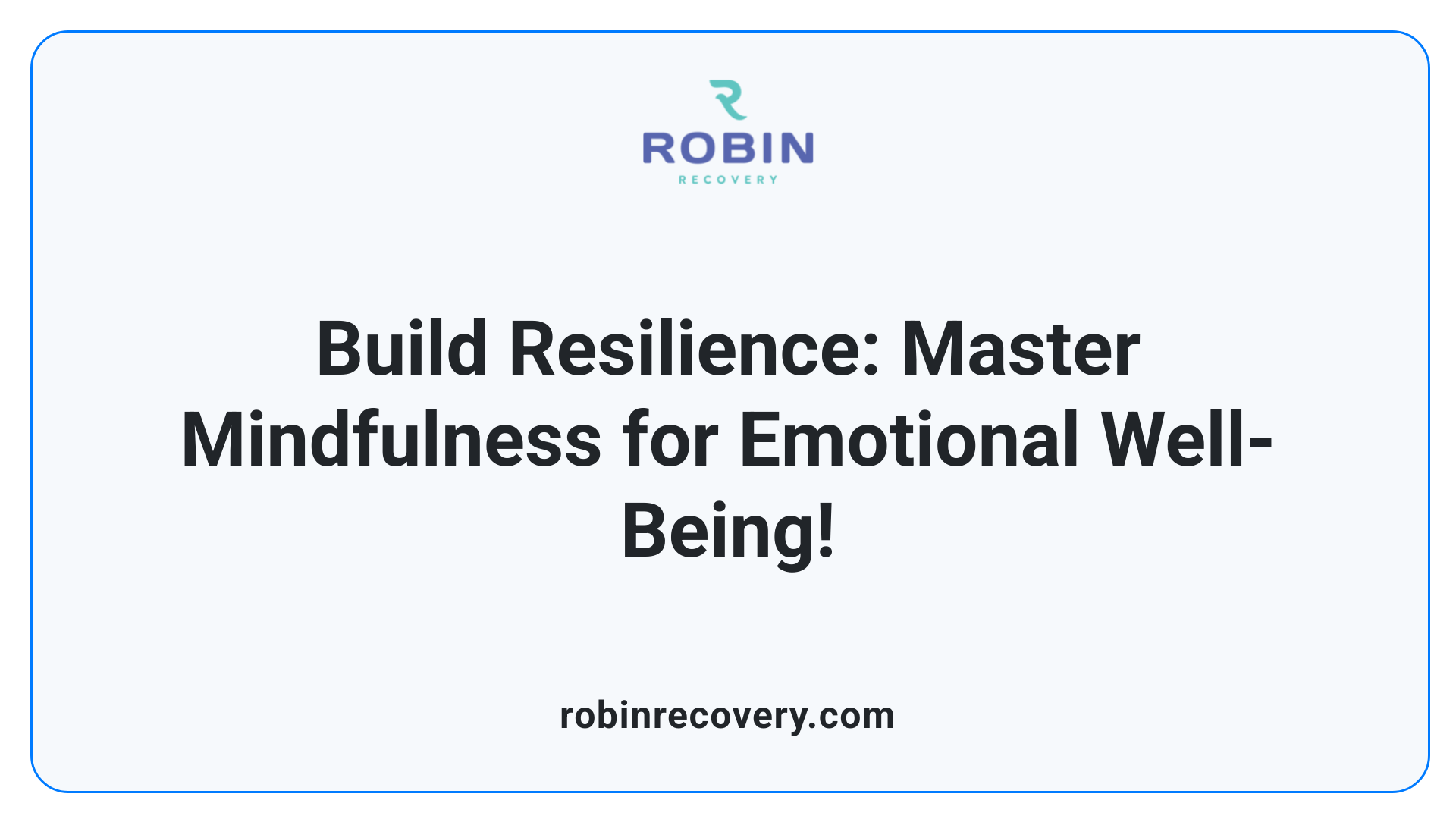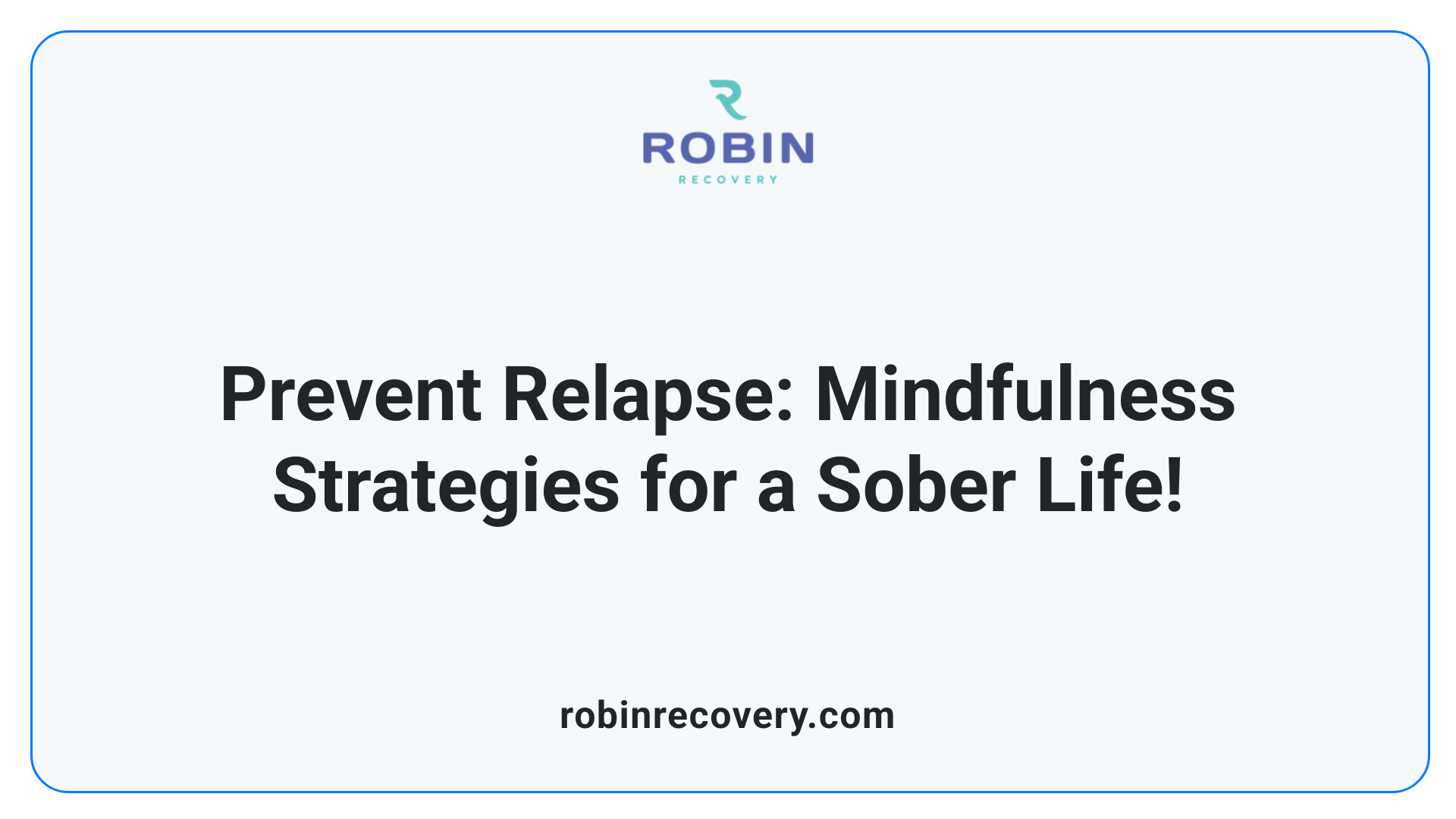How to practice mindfulness during challenging times in recovery

Embracing Mindfulness in the Recovery Journey
In times of recovery, particularly from addiction or mental health challenges, the incorporation of mindfulness practices can steer one's journey towards a healthier, more balanced life. Mindfulness offers a framework for enhancing emotional regulation, managing stress, and building the resilience necessary to navigate through difficult times. This narrative explores the dynamic role mindfulness plays in recovery, providing an array of practical strategies to incorporate into daily routines.
The Mindful Path to Emotional Regulation

Stress Relief Through Present Moment Awareness
Mindfulness is a powerful ally in recovery, particularly in stress relief. By sharpening present moment awareness, individuals can significantly reduce the mental clutter that comes from excessive worry about the past or future. This concentrated focus enables them to observe thoughts and feelings without judgment, avoiding the traps of suppression or overwhelming engagement with distressing emotions. Techniques such as mindful breathing and body scans help to cultivate this practice, promoting a sense of calm and clarity at crucial moments in recovery.
Mindfulness Techniques for Managing Cravings
The practice of mindfulness also plays a vital role in managing cravings. Techniques like urge surfing teach individuals to acknowledge cravings as temporary and separate from their identity, allowing for a non-reactive response. By observing these cravings without judgment, individuals foster a healthier relationship with their impulses, which is essential in preventing relapse. Mindful practices such as focusing on breath or engaging in mindful movement not only enhance emotional regulation but also empower individuals to recognize early signs of distress, equipping them with strategies to cope effectively.
How Does Mindfulness Increase Resilience During Recovery?
Mindfulness increases resilience during recovery by allowing individuals to focus on the present moment and manage their emotional responses more effectively. It equips them with coping skills to handle stress and emotions, crucial for those recovering from addiction. Techniques such as meditation, mindful breathing, and body scans foster emotional regulation and reduce impulsive behaviors, helping to decrease the likelihood of relapse. Regular mindfulness practice can lead to brain changes that enhance emotional control and promote better decision-making. Resources like mindfulness books, apps, and community classes can further support individuals in integrating mindfulness into their recovery journey.
Mindfulness Techniques Benefits in Recovery Applications Mindful Breathing Reduces anxiety and promotes relaxation Daily practice, during cravings Body Scan Meditation Increases awareness of physical sensations To identify stress and cravings Urge Surfing Helps manage cravings without impulsive reactions Effective during triggers Mindful Walking Encourages physical activity and presence Routine exercise in nature
Core Practices for Mindfulness in Recovery

How to practice mindfulness in recovery?
Mindfulness can be practiced in various ways to enhance recovery from addiction. One effective technique is body scan meditation, where individuals focus on different body parts, promoting relaxation and awareness of physical sensations.
Mindful breathing exercises are also crucial; these involve concentrating on the breath to anchor oneself in the present moment. Techniques such as the 4-7-8 breathing method can be particularly helpful for newcomers.
Mindful movement, like yoga or tai chi, allows individuals to unite their body and mind while promoting relaxation. Journaling is another beneficial practice. Writing down thoughts and feelings mindfully helps individuals process emotions and track their recovery journey.
Additionally, mindful eating encourages people to savor the taste and texture of food, fostering appreciation for nourishment. Setting aside time daily for reflection can aid in recognizing triggers and developing stronger coping strategies for cravings.
Practical applications in daily life
Incorporating mindfulness into everyday routines can significantly benefit recovery. Mindful walking turns a simple stroll into a practice of awareness, focusing on each step and one’s surroundings.
Gratitude journaling, where individuals note positive aspects of their day, can help shift focus from cravings and negative thoughts. Regularly engaging in mindful listening during conversations promotes emotional connections and strengthens relationships, a vital support system in recovery.
By weaving these practices into daily life, individuals can sustain a greater sense of awareness, alleviating stress and fostering resilience throughout their recovery journey.
Mindfulness Practice Description Benefits Body Scan Meditation Awareness of bodily sensations from head to toe Reduces tension, enhances relaxation Mindful Breathing Focus on breath to establish presence Lowers stress and anxiety Mindful Movement (Yoga, Tai Chi) Physical activity combined with mindfulness Improves body awareness and emotional balance Journaling Recording thoughts and feelings mindfully Aids in processing emotions and tracking recovery Mindful Eating Paying attention to the taste and texture of food Fosters appreciation for nourishment
Building Emotional Resilience through Mindfulness

Self-compassion and Non-judgment
Practicing mindfulness encourages self-compassion, allowing individuals to approach their feelings and triggers with kindness rather than harsh judgment. This form of acceptance is crucial in recovery, especially for those grappling with feelings of guilt or shame related to their past actions.
Self-compassion involves treating oneself with understanding during moments of difficulty, and it cultivates patience when faced with challenges. By fostering a non-judgmental awareness of thoughts and emotions, individuals can address uncomfortable feelings without being overwhelmed, which enhances their ability to manage stress effectively.
Managing Distress with Mindfulness
Mindfulness offers practical techniques for managing distress, such as focusing on breathing and grounding exercises. These practices allow individuals to anchor themselves to the present moment, where they can observe their thoughts without becoming entangled. Techniques like body scans and mindful walking can help individuals recognize physical manifestations of stress and provide tools to navigate these feelings constructively.
Moreover, mindfulness can significantly improve recovery from trauma. It does so by prioritizing safety and supporting emotional regulation, crucial for trauma survivors. Research indicates that mindfulness practices can alter brain structures related to emotion management, helping individuals build resilience and better cope with triggers that may arise during recovery.
The Science Behind Mindfulness and Recovery

What are the three components of mindfulness in recovery?
The three components of mindfulness in recovery are intention, attention, and attitude.
- Intention involves a commitment to being present and aware in the recovery process, setting a purposeful direction towards healing.
- Attention pertains to focusing on the current moment, observing thoughts and feelings without getting lost in them. This aspect is crucial as it helps individuals manage triggers and cravings effectively.
- Attitude emphasizes cultivating a kind, compassionate, and non-judgmental approach towards oneself, allowing acceptance of both successes and setbacks during recovery.
Together, these components foster a greater sense of self-awareness and resilience, essential for sustainable recovery.
Neural changes induced by mindfulness
Mindfulness not only aids emotional regulation but also induces significant neural changes that support recovery. Regular mindfulness practice has been found to:
- Enhance prefrontal cortex density, which is linked to improved self-control and decision-making processes vital in recovery.
- Decrease amygdala activity, the area of the brain associated with stress responses, leading to lower anxiety levels.These neural adaptations contribute to better emotional regulation and resilience against stressors, enabling individuals to navigate the complexity of recovery with greater ease.
Benefits for stress and anxiety reduction
Mindfulness techniques such as meditation and mindful breathing are scientifically proven to reduce stress and anxiety, creating a more manageable recovery experience.
- Mindful Breathing: This practice helps individuals anchor their attention, reduce anxiety, and promote relaxation.
- Body Scans and Meditation: These exercises enhance self-awareness, allowing individuals to identify and respond to emotional triggers promptly.
Incorporating these practices fosters a calmer mental state, reinforcing the foundation necessary for long-term recovery.
Mastering Mindful Breathing and Its Benefits
Breathing Techniques for Stress Reduction
Mindful breathing is a foundational practice in mindfulness that promotes relaxation and diminishes stress. Techniques such as diaphragmatic breathing and 4-7-8 breathing are effective for individuals in recovery.
- Diaphragmatic Breathing: This method involves breathing deeply from the diaphragm rather than shallowly from the chest. Inhale slowly through the nose for four counts, hold for seven, and exhale through the mouth for eight counts. This can help reduce anxiety and improve focus.
- 4-7-8 Breathing: In this exercise, individuals inhale for four seconds, hold their breath for seven seconds, and exhale for eight seconds. This technique activates the body's relaxation response, promoting calmness, which is particularly beneficial during periods of heightened stress or cravings.
Grounding and Calming Practices
In addition to specific techniques, grounding exercises enhance the effectiveness of mindful breathing.
- Body Scan: This involves lying down and mentally scanning your body from head to toe, noticing areas of tension and releasing them. It encourages awareness of physical sensations, which can help manage stress.
- Mindful Walking: Focusing on each step while walking can be an excellent way to combine movement with mindful breathing, engaging both the body and mind.
By incorporating these breathing and grounding practices into daily routines, individuals in recovery can cultivate emotional regulation and resilience, supporting their overall mental well-being.
Transforming Everyday Activities into Mindful Exercises
Integration of mindfulness into daily life
Incorporating mindfulness into daily routines can significantly benefit individuals in recovery. By transforming mundane activities into mindful exercises, individuals can enhance their awareness and emotional regulation. This practice encourages them to remain present and engaged with their experiences, which can help alleviate cravings and promote emotional stability.
Examples of Mindful Exercises
There are many ways to turn everyday activities into opportunities for mindfulness. Here are some effective practices:
Mindful Activity Description Benefits Mindful Walking Focus on each step, noticing your surroundings. Promotes physical activity while enhancing awareness. Mindful Eating Eat slowly, savoring each bite without distractions. Encourages gratitude for food and helps regulate emotions. Mindful Breathing Take deep breaths, observing the inhale and exhale. Anchors individuals to the present, reducing anxiety. Body Scan Notice sensations from head to toe without judgment. Increases body awareness and fosters self-compassion. Mindful Listening Pay full attention during conversations. Enhances relational dynamics and promotes empathy.
By actively engaging in these mindful practices, individuals can cultivate a sense of calmness and control, essential aspects of maintaining their recovery.
Cultivating Inner Strength with the Seven Pillars of Mindfulness
Understanding and Applying the Seven Pillars
The Seven Pillars of Mindfulness—Non-judging, Patience, Beginner’s Mind, Trust, Non-Striving, Acceptance, and Letting Go—provide a framework for individuals in recovery. Each pillar supports the development of a mindful approach to life, enhancing emotional resilience and self-compassion. For instance:
- Non-judging encourages individuals to observe their thoughts and feelings without labeling them as good or bad. This acceptance can diminish the weight of cravings or distressing emotions.
- Patience cultivates the understanding that recovery is a gradual process, allowing individuals to remain calm during challenging times.
Individuals can embody these pillars by integrating them into everyday practices, such as mindful breathing or journaling. This enhances their ability to engage fully in the present moment, which is critical for managing the ups and downs of recovery.
Supporting Recovery Efforts Through Mindfulness Principles
Incorporating the Seven Pillars into daily routines fosters a supportive environment for recovery. For example, practicing Beginner’s Mind can encourage individuals to approach each day anew, reducing the weight of past failures. Acceptance promotes embracing challenging feelings as part of the recovery journey, helping individuals navigate emotional distress more effectively.
Here are key components of using the Seven Pillars in recovery:
PillarApplication in RecoveryBenefits Non-judging Observing thoughts without judgment Reduces emotional reactivity Patience Cultivating calmness during recovery Enhances tolerance to discomfort Beginner’s Mind Approaching each day without preconceived notions Fosters openness to new experiences Trust Building confidence in one's ability to recover Strengthens self-efficacy Non-Striving Allowing experiences to unfold naturally Reduces pressure and expectations Acceptance Embracing current experiences Promotes emotional balance Letting Go Releasing attachment to past mistakes Facilitates forgiveness and growth
By embracing these pillars, individuals cultivate a strong foundation for their recovery journey, enhancing overall well-being and resilience against addictive behaviors.
Challenges in Practicing Mindfulness and How to Overcome Them
Common hurdles in mindfulness practice
Practicing mindfulness can present various challenges. Many individuals mistakenly believe mindfulness requires a clear mind, making it difficult to begin. Others struggle to find time for mindfulness exercises amidst busy schedules. The pressure to achieve immediate results can lead to frustration, deterring consistent practice. Additionally, feelings of restlessness or racing thoughts can impede the experience, causing individuals to abandon their efforts.
Strategies for creating a supportive environment
To successfully navigate these challenges, consider starting with short, manageable mindfulness sessions. Incorporating mindfulness into daily routines—like mindful breathing during morning coffee or practicing meditation for a few minutes before bed—can be effective.
Creating a supportive environment is vital. This might involve practicing mindfulness with a group or using guided meditations available through apps. Journaling feelings can help individuals articulate their experiences, reinforcing mindfulness benefits. Additionally, fostering self-compassion towards oneself during practice encourages a balanced approach, emphasizing progress over perfection. By implementing these strategies, individuals in recovery can cultivate a sustainable mindfulness practice, enhancing their emotional resilience and coping skills.
Mindful Relationships: Strengthening Support Networks in Recovery
Empathy and Active Listening
Mindful relationships are vital in recovery as they foster empathy and active listening. By practicing mindfulness, individuals enhance their ability to be fully present during conversations. This means truly hearing what others are saying without being distracted or formulating responses while they speak. Instead, mindfulness encourages individuals to connect deeply, making relationships more supportive and understanding.
Building Supportive Community Relationships
Building a supportive community is crucial as relationships can significantly impact recovery outcomes. Through mindfulness, people can develop healthier ways to relate to others. This involves being aware of one's own feelings and reactions, promoting a non-judgmental environment.
Supporting peers in recovery through constructive conversations enhances trust and emotional security, crucial for sharing challenges. Establishing these mindful connections not only nurtures personal growth but also creates a network of mutual support.
In essence, mindful relationships cultivate a sense of belonging and camaraderie among individuals in recovery, helping them navigate challenges together and celebrate achievements.
Guarding Against Relapse with Mindfulness-Based Relapse Prevention

Mindfulness and Relapse Prevention Strategies
Mindfulness plays a critical role in relapse prevention by cultivating awareness of cravings and emotional responses. This awareness is essential for recognizing early warning signs of relapse, such as negative thoughts or increased stress levels. By implementing techniques like urge surfing, individuals can acknowledge cravings without succumbing to them. This nonreactive approach promotes healthier responses to triggers and encourages individuals to sit with discomfort without resorting to substance use.
Regular mindfulness practice can reduce the likelihood of relapse by fostering emotional regulation, which enables individuals to navigate intense emotions effectively. Different mindfulness strategies such as body scans, mindful breathing, and mindful walking can anchor individuals to the present moment, aiding in the management of cravings and emotional distress.
Integrating Mindfulness with Behavioral Therapies
Combining mindfulness with behavioral therapies such as Cognitive Behavioral Therapy (CBT) or Mindfulness-Based Cognitive Therapy (MBCT) enhances recovery outcomes. Mindfulness-based relapse prevention integrates mindfulness principles with cognitive and behavioral strategies to equip individuals with the necessary skills to maintain sobriety.
During therapy sessions, participants learn to observe their internal experiences without judgment, which supports self-compassion and reduces feelings of guilt or shame. This integration enables individuals to better manage their triggers and build resilience against future stressors, ultimately reinforcing a committed recovery path.
Mindfulness TechniquePurposeBenefits Mindful Breathing Grounding and calming Reduces anxiety, enhances focus Body Scan Meditation Increases body awareness Identifies stress locations and responses Urge Surfing Recognizes cravings without action Promotes self-control Mindful Walking Combines movement with present awareness Improves emotional balance Mindfulness-Based Therapy Supports cognitive restructuring Strengthens coping mechanisms
By integrating these mindfulness practices into daily contexts and therapy sessions, individuals create a robust framework that guards against relapse, fostering a supportive environment for sustained recovery.
Integrating Mindfulness for a Sustained Recovery
Mindfulness provides a comprehensive array of tools that empower individuals on their recovery journey, equipping them with the skills necessary to navigate challenges with resilience and presence. By embedding mindfulness into daily routines, one can find solace, strength, and a renewed commitment to a healthier, addiction-free life. The path to recovery is undoubtedly challenging, but with mindfulness, individuals are better prepared to embrace each moment with clarity and compassion.
References
- How to Stay Present in Recovery: Benefits of Mindfulness
- Power of Mindfulness in Addiction Recovery | RACNJ
- Using Mindfulness Principles on Your Recovery Journey | EHN
- Mindfulness Techniques For Lasting Recovery - Ethan Crossing
- Mindfulness Techniques for Addiction Recovery
- Mindfulness Practices for Reducing Stress and Relapse in Addiction ...
- Why Mindfulness Is Essential in Long-Term Recovery
- Unleashing the Power of Mindfulness in Addiction Recovery
